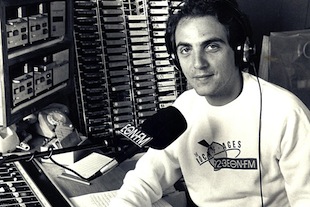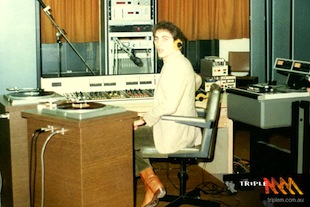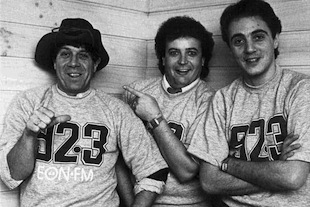Craig Bruce chats with Triple M legend Lee Simon

Earlier this year, Triple M's Lee Simon celebrated 33 years in radio. Although back in 1980 it was known as EON FM, which officially started on July 11, he has still been at the same station for over 3 decades.
SCA's Head of Content Craig Bruce recently interviewed Lee about his long radio career. He has shared it with Radio Today below…..
Craig: You’re the poster child for career longevity. What’s your secret ?
Lee: Treat every day like it’s your first day in radio. Anything and everything is possible.
At a more instinctive level, develop the knowledge to foresee rising waters and to find higher ground.
Craig: I remember Guy Dobson saying to me a few years back “There’s no old people in radio”, what I think he meant was there's no room for old thinking in radio. How important is it to keep educating yourself and staying on top of emerging trends ?
Lee: Staying on top is built into the job description. Not negotiable. It should ideally and instinctively be part of the natural passion and curiosity which steered you towards radio in the first place.
 Craig: You were a star on the radio back in the late 70’s/early 80’s-what has changed, what has stayed the same in terms of announcer skill-sets and expectations ?
Craig: You were a star on the radio back in the late 70’s/early 80’s-what has changed, what has stayed the same in terms of announcer skill-sets and expectations ?
Lee: In terms of station structure and ethos, everybody understood and truly believed that Content was King. Full stop.
For many of us, it still is regardless of changed imperatives and, tellingly, resource allocation.
Rightly or wrongly, announcers were the rock stars in the equation, a role which, at best, is now considered to be the sole domain of breakfast, drive and gun sales guys.
Expectations then were that your mid dawn jock* could do as much as your breakfast jock to engage a listener and to make or break a station.
There was also an almost pathological hatred of our competitors. I fondly remember the mutual declaration of war on and by Jeff Allis and Dobbo when they were The Fox and we were Triple M. Pre-merger. We believed we were some sort of Ninjas and it almost became physical on several occasions.
Sigh.
The paradox is that the skill set has remained the same. We are blessed with many gifted practitioners who are dedicated to prep, ‘showbiz’, execution and product/market/audience knowledge.
Only the swagger has been systematically erased. THAT was the X Factor.
*the mandatory, live shift EVERY announcer undertook to hone their skills in the bush, then regional, then metro to prove themselves before being let loose on a broader audience. Sadly, now extinct or known as ‘Weekend Breakfast Development Show’
Craig: You’ve identified and nurtured some of Australian radio’s best shows, including the DGen and Richard Stubbs. Which one has been your favourite on-air performer or team ?
Lee: The most satisfying validation of talent choice is becoming one of their biggest fans.
The D Gen literally reinvented breakfast radio as a genuine ensemble group which came with built in, natural chemistry and a fervent belief that their individual role was to make each other shine. I have not yet known another on-air team which has worked harder or smarter.
In their own ways, I believe that the original Saturday morning Grill Team led by Eddie McGuire and our current AFL commentary team led by James Brayshaw embrace the same values.
All three are shining examples of hiring the tallest possible people and then giving them the space, respect and resources they need to do what they do best (and, better than you which is why you gave THEM the job!).
 |
| L-R : Molly Meldrum, Gavin Wood, Lee Simon |
Craig: You have a huge passion for music, has this helped with your longevity ? Does it surprise you that so many announcers today seem to be disconnected with the songs they play?
Lee: In a word, yes.
I’m staggered that people who are dispassionate about our core product choose an on air career as their best option in radio.
Craig: You've seen so much success up close, do the superstars share any personality traits and attitudes ?
Lee: Yes. Relentless pursuit of excellence. Contempt for the mediocre. Massive ego. Greed. Stubbornness. Healthy disregard of rules and authority. Genuinely lateral creativity. Low boredom threshold. Brutal competitiveness.
Oh, and a massive ‘insecuriority’ complex which drives the above. (Insecurity, Inferiority AND AT THE SAME TIME, Superiority complex)
These are all good things.
None would be the superstars they became without them.
There’s only pain ahead for anyone who tries to ‘correct’ their traits.
Craig: What mistakes have you made along the way that have taught you the best lessons ?
Lee: Someone much smarter than me once observed that ‘if you’re not making mistakes, you’re not trying hard enough.’ I’ve made plenty.
Finding the balance between backing yourself in and deferring to research takes courage. A good boss will encourage that.
In house, listening achieves much more than speaking.
An especially hard lesson for me was to dial back my enthusiasm when dealing with people who don’t allow their passion to enter the equation (or have none according to the ‘Gen’ to which they belong).
Don’t strive for perfection. You’ll be in a perpetual state of disappointment. Nothing’s perfect.
Contrary to convention, I believe the individual listener is more powerful and important than your audience as a whole.
Persevere. If you deeply believe in something, don’t accept being knocked back. Our AFL coverage is an example which, in turn, introduced the widespread sport DNA we now embrace.
It takes courage to rebuild the format when you sense it’s wrong.
It takes even greater courage to NOT fiddle with it when you sense it’s right.
Having a different opinion doesn’t make it a better opinion just because you’re the PD.
Try to identify and employ people who you think have the potential to one day take your job and do your best to provide them with the environment in which to do so.
Craig: Thanks for giving me my first chance. I'll always be grateful.
Lee: You earned it and deserved it. I’ll always be grateful!


